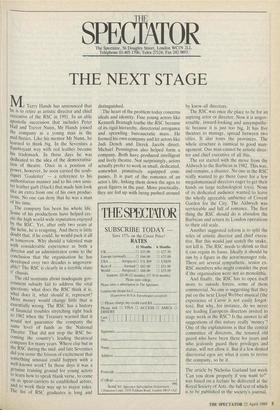SPECT THE AT OR
The Spectator, 56 Doughty Street, London WC1N 2LL Telephone 01-405 1706; Telex 27124; Fax 242 0603
THE NEXT STAGE
Mr Terry Hands has announced that he is to retire as artistic director and chief executive of the RSC in 1991. In an able apostolic succession that includes Peter Hall and Trevor Nunn, Mr Hands joined the company as a young man in the mid-Sixties. Like his mentor Mr Nunn, he learned to think big. In the Seventies a flamboyant way with red leather became his trademark. In those days he was dedicated to the idea of the democratisa- tion of theatre. Once in a position of Power, however, he soon earned the soub- riquet 'Gauleiter' — a reference to his authoritarian manner and to his own sinis- ter leather garb (black) that made him look like an extra from one of his own produc- tions. No one can deny that he was a man of his time.
The company has been his whole life Some of his productions have helped cre- ate the high world-wide reputation enjoyed by the RSC. Yet, after only two years at the helm, he is resigning. And there is little doubt that, if he could, he would pack it all Ill tomorrow. Why should a talented man With considerable experience as both a director and an administrator come to the conclusion that the organisation he has developed over two decades is ungovern- able? The RSC is clearly in a terrible state o chassis.
The old nostrums about inadequate gov- ernment subsidy fail to address the vital questions: what does the RSC think it is, What does it, what should it, represent? More money would change little that is essentially wrong. The RSC has a history of financial troubles stretching right back to 1962 when the Treasury warned that it would not guarantee the company the same level of funds as the National Theatre. That did not stop the RSC be- coming the country's leading theatrical Company for many years. Where else but in the RSC during the mid- and late Seventies did you sense the frisson of excitement that something unusual could happen with a well-known work? In those days it was a genuine training ground for young actors to learn how to speak blank verse, to come On as spear-carriers to established actors, and to work their way up to major roles. The list of RSC graduates is long and
distinguished.
The heart of the problem today concerns ideals and identity. Fine young actors like Kenneth Branagh loathe the RSC because of its rigid hierarchy, directorial arrogance and sprawling bureaucratic mass. He formed his own company and let actors like Judi Dench and Derek Jacobi direct. Michael Pennington also helped form a company. Both have produced intelligent and lively theatre. Not surprisingly, actors actually prefer to work in small, dedicated, somewhat primitively equipped com- panies. It is part of the romance of an actor's life, linking them down the ages to great figures in the past. More practically, they are fed up with being pushed around by know-all directors.
The RSC was once the place to be for an aspiring actor or director. Now it is ungov- ernable, inward-looking and unsympathe- tic because it is just too big. It has five theatres to manage, spread between two cities. It also tours the provinces. The whole structure is inimical to good man- agement. One man cannot be artistic direc- tor and chief executive of all this.
The rot started with the move from the Aldwych to the Barbican in 1982. This was, and remains, a disaster. No one in the RSC really wanted to go there (save for a few megalomaniacal directors eager to get their hands on large technological toys). None of its dedicated audience wanted to leave the wholly agreeable ambience of Covent Garden for the City. The Aldwych was serviceable and full of romance. The first thing the RSC should do is abandon the Barbican and return its London operations to their old scale.
Another suggested reform is to split the roles of artistic director and chief execu- tive. But this would just scotch the snake, not kill it. The RSC needs to shrink so that it can regain its focus. Ideally it should be run by a figure in the actor/manager role. There are several sympathetic, senior ex- RSC members who might consider the post if the organisation were not so monolithic.
And finally, the RSC has to open itself more to outside forces, some of them commercial. No one is suggesting that they put on the next Lloyd Webber musical (the experience of Carrie is not easily forgot- ten). But why, for instance, do we never see leading European directors invited to stage work in the RSC? Is the answer to all suggestions of this nature really 'money'? One of the explanations is that the central committee of directors, the tenured old guard who have been there for years and who jealously guard their privileges and status, will not allow it. But if a few dented directorial egos are what it costs to revive the company, so be it.


































































 Previous page
Previous page